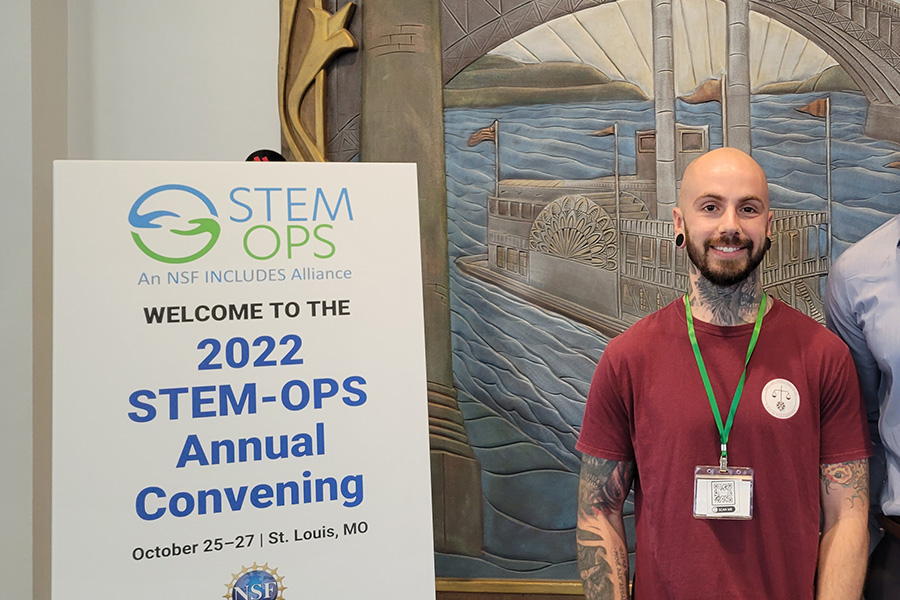By Lyra Fontaine
Since transferring to the UW from Everett Community College in 2020, Raymond Haug has helped build a race car through the Formula Motorsports club and completed two engineering internships at SpaceX. As he gets ready to graduate with a bachelor’s degree, he’s adding more experiences to the list – specifically getting involved in STEM outreach and engagement for people impacted by incarceration.

Student Raymond Haug spoke at the 2022 STEM-OPS annual meeting.
STEM Opportunities in Prison Settings (STEM-OPS) is an National Science Foundation (NSF) alliance that works to expand science, technology, engineering and mathematics educational opportunities in U.S. prisons and promote access to STEM for people impacted by incarceration. Haug, who is formerly incarcerated, was invited to speak at a panel during its first annual conference in St. Louis, Missouri, in October.
During the panel, “Success Through Chaos: Student Perspectives on STEM Access Following Incarceration,” Haug and students from Stanford University and Ohio State University discussed their experiences and what helped them be successful at R1 research universities.
We can’t deny the numbers and success stories of the people at the conference, so why are we not exploring the untapped potential of people who are in prisons? Hopefully STEM-OPS creates more allies and support for people like me.”
“The event was filled with hope and possibility,” he says. “The biggest takeaway was that we can’t deny the numbers and success stories of the people at the conference, so why are we not exploring the untapped potential of people who are in prisons? Hopefully STEM-OPS creates more allies and support for people like me.”
At the conference, Haug connected with people working in education across the country. He enjoyed learning about efforts in Missouri such as LaunchCode, which trains people in prisons to learn computer programming. He now plans to work with the organization to share his story at a correctional center in Missouri through Zoom.
After his time in prison, Haug received an associate degree from Everett Community College, then transferred to the UW.
“When I got out with a ninth-grade education, I didn’t even know what engineering was,” Haug remembers. “I didn’t see anyone go to college after getting out, and I didn’t see anyone be successful in these spaces. For my first three years in college, I didn't know anyone else in STEM who was formerly incarcerated.”
Research shows that incarcerated individuals who participated in education while in prisons were 48% less likely to return to prison within three years compared to incarcerated individuals who did not participate in education programs while in prison.
“If I can share my story and show that change is possible, it makes it easier for the next person,” Haug says. “You can be an engineer. There doesn’t have to be limits that society might place on formerly incarcerated individuals.”
During his time at the UW, which started during the pandemic, Haug has found mentorship among faculty such as ME Professor Nate Sniadecki. He recommends that other students join a registered student organization to gain experience completing engineering projects and reach out to potential mentors.
“You have to be intentional at such a large school about making yourself known,” he says. “Non-traditional students like myself can feel imposter syndrome, but it helps to reach out to faculty to ask for support. You will find your people.”
Haug hopes to work with the state Board of Community and Technical Colleges to provide opportunities for STEM education in Washington state prisons. After graduation, Haug is interested in entering industry, pursuing a graduate degree and teaching subjects such as math at prisons.
“People impacted by incarceration could be housing so much talent and may not even be aware of it,” he says. “My time in community college was so transformational for me and I want to give back by being a support system for others.”
Originally published December 5, 2022